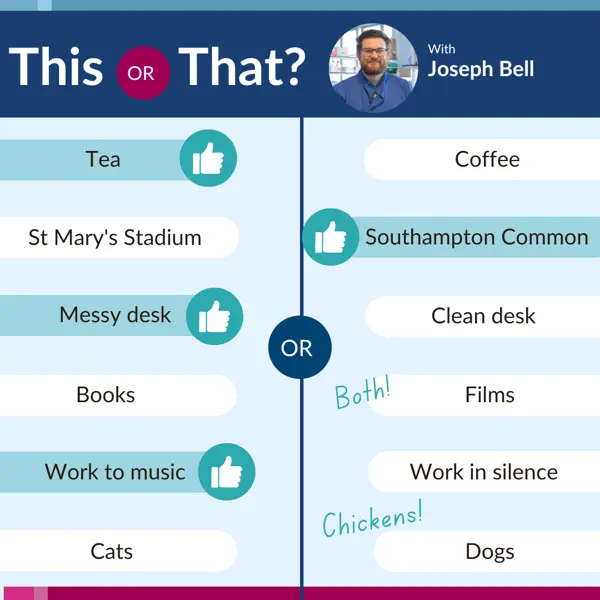Shedding light on lung disease: Meet Joseph Bell
Southampton researchers are improving understanding and treatment of a group of rare diseases.
Patients with fibrotic lung diseases experience shortness of breath that gets worse over time. The most common form is idiopathic pulmonary fibrosis.
Researchers in our NIHR Southampton Biomedical Research Centre (BRC) hope to uncover its biological cause. This could result in better treatments.
Dr Joseph Bell is driving the project forward. He explains how he got started in research and what he hopes to achieve through a one-year BRC Postdoctoral Bridging Fellowship.
How did you become interested in research?
Since I was a little kid, I’ve always been interested in how things work – everything from space rockets to special effects! I’ve always loved Biology. I studied Biochemistry at university as it seemed like the ultimate in “how things work” – the hidden mechanisms inside us which make everything else tick.
That curiosity is ultimately what led to my PhD and current work looking at mechanisms of disease in the lung. I am channelling my curiosity into something that can be beneficial to people.
What is the healthcare challenge that you are seeking to address?
My main interest is fibrotic lung disease. This is a broad term for a set of conditions where people’s lungs progressively fill with scar tissue, leading to difficulty breathing. In many cases, this is fatal, with worse prognosis than several forms of cancer.
While not as common as other lung conditions, it is on the rise in the UK and currently has no cure. Existing treatments only serve to slow the disease’s progress. My broad aim is to try and identify the biological mechanisms which cause the disease. This could ultimately help to generate new and better ways to treat it.

What do you hope to achieve in your research at the BRC?
My research focusses on trying to characterise and replicate the complex environment found within the lungs of people with this disease. I’m using technology that shows where specific molecular signatures exist within microscopic areas of the lung.
My aim is to identify what changes between healthy and diseased lung. I will replicate these changes in cultured human cells to try and model what is happening within the disease.
The end goal is to use these findings to identify how to reverse these mechanisms of disease. This could eventually lead to new treatments for lung fibrosis.
How would you sum up your fellowship in three words?
Modelling lung environments
What's it like being an early career researcher in Southampton?
Being an ECR here is great! I’m lucky enough to be in a fantastic group of other researchers here in the Brooke Lab at Southampton General Hospital and I receive great support from more senior colleagues. I find there’s a lot of freedom to explore my research interests, as well as some world-class research facilities.
Life here is quite fast paced. I tend to have multiple projects to work on at any one time. Southampton itself is a good place to be – 20 minutes from the New Forest, sunny and surprisingly green!
What advice would you give other early career researchers?
Network! This is the point in your career where you need to be building up contacts and collaborators in your own right. It can be intimidating, especially with senior academics, but the days of the cloistered academic in their ivory tower are long gone. Having access to different points of view and sources of expertise is vital, and often very rewarding to boot.
Good time management is also key. As you transition to becoming an independent researcher, there will always be multiple drains on your time. Being able to manage different commitments is crucial to being an effective scientist.
Finally, try and enjoy it. At the end of the day, you’re figuring out things that nobody has ever worked out before! That’s a pretty fun place to be.